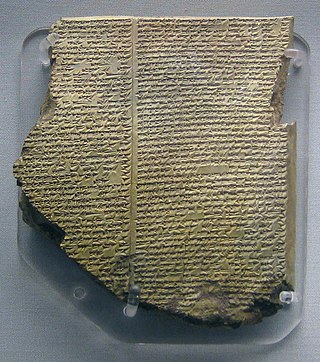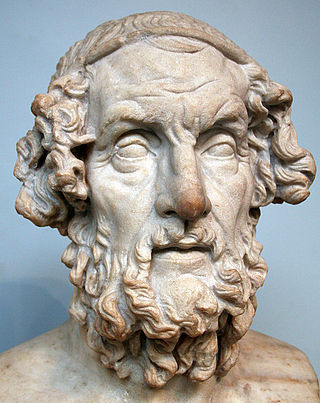Related Research Articles

An epic poem, or simply an epic, is a lengthy narrative poem typically about the extraordinary deeds of extraordinary characters who, in dealings with gods or other superhuman forces, gave shape to the mortal universe for their descendants.

Homer was a Greek poet who is credited as the author of the Iliad and the Odyssey, two epic poems that are foundational works of ancient Greek literature. Homer is considered one of the most revered and influential authors in history.

Ludovico Ariosto was an Italian poet. He is best known as the author of the romance epic Orlando Furioso (1516). The poem, a continuation of Matteo Maria Boiardo's Orlando Innamorato, describes the adventures of Charlemagne, Orlando, and the Franks as they battle against the Saracens with diversions into many sideplots. The poem is transformed into a satire of the chivalric tradition. Ariosto composed the poem in the ottava rima rhyme scheme and introduced narrative commentary throughout the work.

Anselm Paul Alexis Hollo was a Finnish poet and translator. He lived in the United States from 1967 until his death in January 2013.
Ted Berrigan was an American poet.
Alice Notley is an American poet. Notley came to prominence as a member of the second generation of the New York School of poetry—although she has always denied being involved with the New York School or any specific movement in general. Notley's early work laid both formal and theoretical groundwork for several generations of poets; she is considered a pioneering voice on topics like motherhood and domestic life.
Latino poetry is a branch of American poetry written by poets born or living in the United States who are of Latin American origin or descent and whose roots are tied to the Americas and their languages, cultures, and geography.
The Poetry Project at St. Mark's Church was founded in 1966 at St. Mark's Church in-the-Bowery in the East Village of Manhattan by, among others, the poet and translator Paul Blackburn. It has been a crucial venue for new and experimental poetry for more than five decades.
Douglas Dunlop Oliver was a poet, novelist, editor, and educator. The author of more than a dozen works, Oliver came into poetry not as an academic but through a career in journalism, notably in Cambridge, Paris, and Coventry, before attending the University of Essex in the 1970s. He received a B.A. (literature) in 1975 and an M.A. in 1982. Oliver subsequently lived in Brightlingsea, Paris, New York, and again Paris, usually working as a lecturer.
Nationality words link to articles with information on the nation's poetry or literature.
The female epic is a concept in literary criticism that seeks to expand generic boundaries by identifying ways in which women authors have adapted the masculine epic tradition to express their own heroic visions.

Caribbean poetry is vast and rapidly evolving field of poetry written by people from the Caribbean region and the diaspora.
Martín & Meditations on the South Valley is a semiautobiographical poetry collection or "novel in verse" written by Jimmy Santiago Baca and published in 1987. Contents of the book include an introduction by Denise Levertov,, Martín, an epic poem in nine parts, Meditations on the South Valley, a continuation of Martín in twenty-eight parts, and two glossaries of Spanish words, phrases, and references in English.
Jordan Davis is an American poet. He is one of the Flarf poets. He is poetry editor of The Nation.

Gillian McCain is a Canadian poet, author, and photography collector best known for Please Kill Me: The Uncensored Oral History of Punk, which she co-wrote with Legs McNeil. McCain is the author of two books of poetry: Tilt and Religion. Portions of her "found photo" collection have been featured in magazines, published as limited edition books, and exhibited at the Camera Club of New York gallery. She sat on the board of directors of the Nova Scotia College of Art and Design in Halifax and was the Chair of the Board of Directors of the Poetry Project at St. Mark's Church in-the-Bowery New York City.
Nomad was an avant-garde literary magazine that Anthony Linick and Donald Factor edited and published in Los Angeles between 1959 and 1962. The first issue came out in the winter of 1959. Linick and Factor were particularly drawn to the poetry and writing of the Beat Generation, who wrote of their own, frequently chaotic, lives.
Tom Savage is an American poet most closely associated with the New York School. He attended the Naropa Institute in 1976 and with James Sherry co-edited the inaugural issue of Roof Magazine. He is the author of upwards of seven volumes of poetry, including; "Housing, Preservation & Development", "Processed Words", "Political Conditions Physical States" and "From Herat to Baikh and Back Again". He has taught workshops at among other places; the Poetry Project, the Juilliard School and Saint Malachy's Roman Catholic Church. He has edited Tamarind magazine which has been published on and off for many years.
Ed Friedman is an American poet and playwright.

Paul Goodman described himself as a man of letters but foremost a poet. He published several poetry collections in his life, including The Lordly Hudson (1962), Hawkweed (1967), North Percy (1968), and Homespun of Oatmeal Gray (1970). His Collected Poems (1973) were published posthumously.
Tamar is an epic poem by the American writer Robinson Jeffers, first published in 1924. A tale of incest and violence, it follows Tamar Cauldwell, the daughter of a Californian ranch family, as she experiences transgression, hatred, and destruction. Tamar was the first unrhymed narrative poem Jeffers wrote. The story makes references to the biblical Books of Samuel and deals with themes of nature and corruption.
References
- 1 2 3 4 Terence Diggory (2009). Encyclopedia of the New York School Poets. Infobase Publishing. pp. 152–. ISBN 978-1-4381-1905-2.
- ↑ Eric L. Haralson (21 January 2014). Encyclopedia of American Poetry: The Twentieth Century. Routledge. pp. 514–. ISBN 978-1-317-76322-2.
- ↑ Alice Notley (1 April 1996). The Descent of Alette. Penguin Publishing Group. ISBN 978-1-4406-2143-7.
- ↑ "Alice Notley: The Descent of Alette". The Lab. Retrieved April 21, 2019.
- Alice Notley (1 April 1996). The Descent of Alette. Penguin Publishing Group. ISBN 978-1-4406-2143-7.